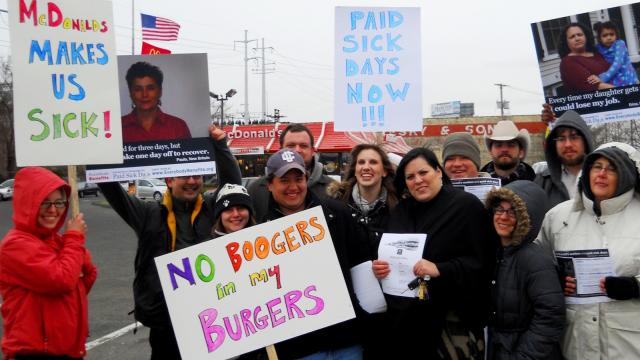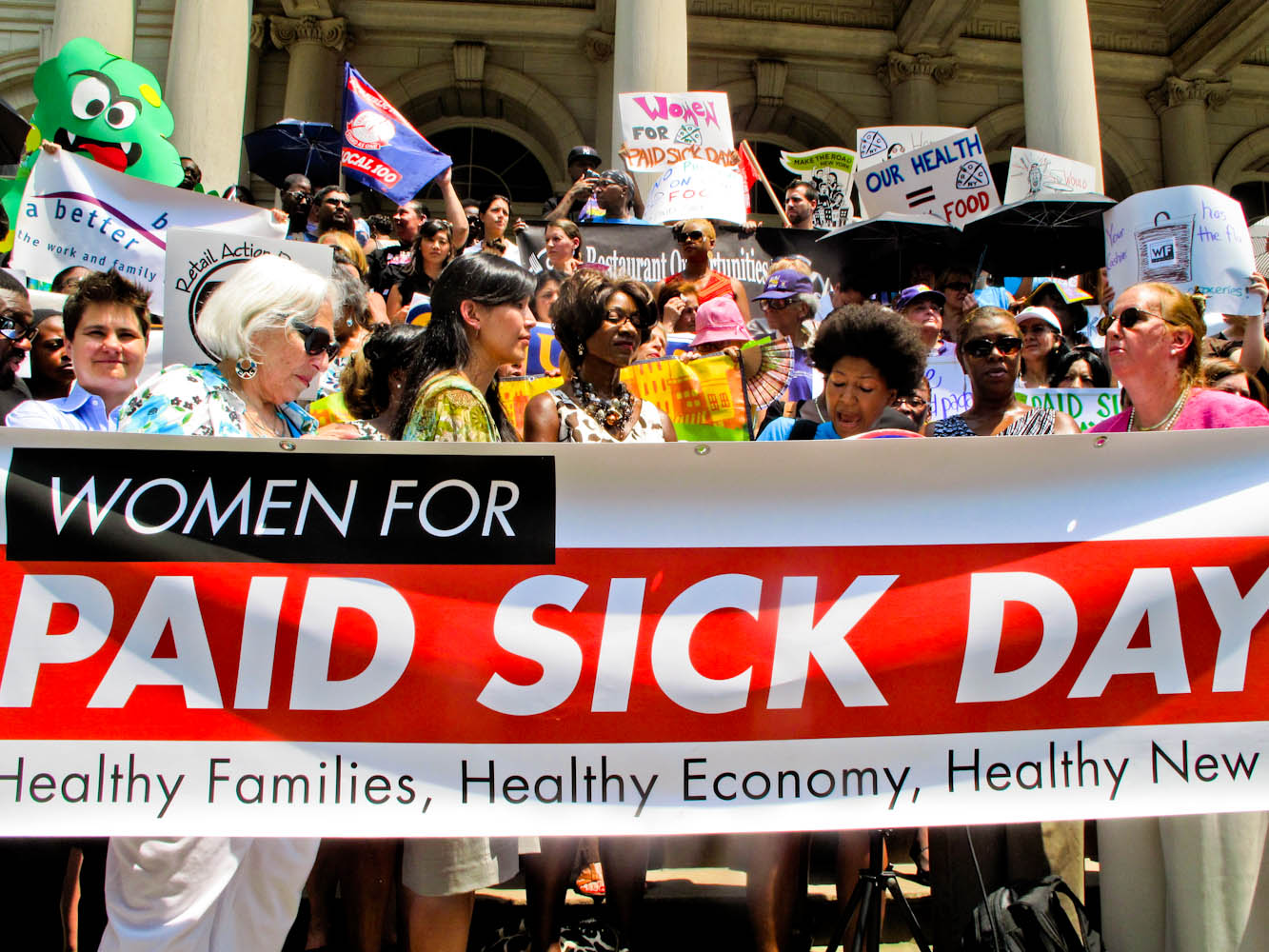
In a victory for working families, New York is poised to become the largest U.S. city to require businesses offer paid sick days to workers. Community activists and labor leaders struck a deal with City Council Speaker Christine Quinn to allow a vote on a paid sick leave ordinance that would cover almost 1 million people. But workers in more than 700 other large American cities must choose between spreading their illness and getting paid.
Advocates have helped pass paid sick days laws in cities like San Francisco, Washington DC, Seattle and Portland, but big business has been pushing back. Corporate-backed bills have passed at the state level in Wisconsin, Louisiana, and Mississippi that would preempt (or as one GOP operative put it, "deliver the kill shot" to) local laws requiring paid sick days. Similar bills are on the legislative docket in Florida, Arizona, Indiana, Michigan, Oklahoma, and Washington. This paid sick days preemption effort can be traced back to Wisconsin Governor Scott Walker and the American Legislative Exchange Council (ALEC).
Paid Sick Days Help Keep America Healthy
Workers who do not have access to paid sick days are one-and-a-half times more likely to go to work sick with a contagious illness, putting their co-workers and customers at risk, and costing an estimated $160 billion each year in lost productivity. Children are more likely to go to school sick when their parents can't get off work to care for them, causing illness to spread. Delaying treatment for illness can cause conditions to worsen, leading to more emergency room visits and increased costs for public health insurance programs.
An estimated 40 million workers, or forty percent of the workforce, cannot take sick days without losing wages or possibly their jobs, according to the Bureau of Labor Statistics. The Family Medical Leave Act (FMLA) only provides for unpaid leave, and only applies to employers with more than 50 employees. Approximately forty percent of workers do not qualify for the FMLA, and those who do often don't take sick days for financial reasons.
Seventy-nine percent of food industry workers — who are especially likely to spread illness if they go to work sick — don't get paid sick days, according to a Food Chain Workers Alliance study. A recent Centers for Disease Control study found that more than half of all norovirus outbreaks can be traced back to sick food service workers.
In response to this public health and economic issue, cities and counties have proposed ordinances that require employers allow workers to call-in sick without losing their jobs or wages. And corporate interests are pushing back. In New York City, business lobbyists managed to get City Council Speaker and mayoral hopeful Christine Quinn to block the legislation for three years, before a long-term campaign by worker's advocates put her in the hot seat and made it politically untenable to continue blocking the bill.
Big business has also lobbied the statehouses, in many cases successfully, to disregard "local control" and nullify and permanently preempt paid sick leave ordinances passed at the local level. And the legislation appears to have spread thanks to a bill promoted and passed by Wisconsin Governor Scott Walker, and shared at an ALEC meeting in 2011.
Walker's Anti-Paid Sick Day Law in Wisconsin Brought to ALEC
In May of 2011, Governor Walker pushed Senate Bill 23 to override a Milwaukee ordinance providing for paid sick days. It appeared to be the first paid sick days preemption bill passed in the country.
Milwaukee's ordinance specified that paid sick days could be used if a worker is ill or needs to care for a sick child, and passed via referendum with over 70 percent of the popular vote in 2008. The 2011 state law not only steamrolled local democratic will by overriding a law passed overwhelmingly in a popular vote, but also repealed the rights of working people to get medical treatment they need, care for their children, and help safeguard the health of their families, coworkers and customers.
A few months later, at ALEC's August 2011 Annual Meeting in New Orleans, the bill was brought to the Labor and Business Regulation Subcommittee of the ALEC Commerce, Insurance and Economic Development Task Force.
Meeting attendees were given complete copies of Wisconsin's 2011 Senate Bill 23 (now Wisconsin Act 16) as a model for state override. ALEC's Labor and Business Regulation Subcommittee at the time was co-chaired by YUM! Brands, Inc., which owns Kentucky Fried Chicken, Pizza Hut and Taco Bell.
Legislators attending the Labor and Business Regulation Subcommittee meeting were also handed a target list and map of state and local paid sick leave policies prepared by ALEC member the National Restaurant Association.
In Wisconsin, the state chapter of the National Restaurant Association lobbied for Senate Bill 23 to repeal Milwaukee's sick days ordinance, as did the local branch of the U.S. Chamber of Commerce, an ALEC member.
And a similar pattern of opposition has emerged across the country: as cities like Seattle, Portland, and Philadelphia have taken up paid sick days, the state and local chapters of ALEC members the National Restaurant Association and U.S. Chamber of Commerce have lined up against it. Other consistent paid sick leave opponents include the National Federation of Independent Business (NFIB), an ALEC member that presents itself as "the voice of small business" but lobbies primarily for big corporate interests, as the Center for Media and Democracy has described at NFIBexposed.org. Restaurant giant Darden (parent company of Red Lobster, Olive Garden, Capital Grille and others) has also emerged as a major paid sick leave foe. Darden is an ALEC member and has had a representative on ALEC's corporate board.
Opponents of paid sick days also regularly cite a "study" from a corporate front group called the Employment Policies Institute purporting to show that employers in Connecticut cut jobs and benefits after a mandatory paid sick leave law took effect. The front group is one of many formed by super-lobbyist Rick Berman — who has also formed groups like the Center for Consumer Freedom, a front for the fast food, alcohol and tobacco industries — and has received $2.8 million between 2009 and 2011 from the Milwaukee-based Bradley Foundation, which is also a major ALEC funder.
These same big business interests have backed proposed state laws to thwart local sick leave ordinances that reflect the Milwaukee legislation. Sick leave preemption bills have spread across the country since the August 2011 ALEC meeting where Wisconsin's bill was shared. In 2012, a sick days preemption bill was introduced in Tennessee and became law in Louisiana, and in 2013, similar bills have been introduced in Florida,http://apps.leg.wa.gov/documents/%20billdocs/2013-14/Pdf/Bills/Senate%20...)">Washington, Mississippi,Michigan, Arizona, Indiana, and Oklahoma.
ALEC Politician Works to "Deliver the Kill Shot" in Florida
The battle might be most heated in Florida.
Orange County is following in Milwaukee's footsteps, with advocates gathering more than 50,000 signatures last year to place a sick-time measure on the ballot. The referendum was kept off the November 2012 ballot because of a delaying campaign coordinated by Orange County commissioners working with big business, including ALEC member Darden Restaurants, the Florida Chamber of Commerce, Disney and others. In February, a court found the County had violated "the plain meaning of its charter" by refusing to put paid sick days in front of voters.
Text messages released through open records requests indicate the delaying tactics were part of a strategy to kill the initiative entirely.
In early September, Orange County GOP Chair Lew Oliver texted Commissioner Ted Edwards saying he wants "at least one good faith straight face test reason to at least delay it long enough to keep it off the ballot in November. After that, the Legislature can deliver the kill shot."
The "kill shot" would come from Florida legislators duplicating the anti-democratic tactics of Wisconsin's governor.
House Majority Leader Steve Precourt (R), an ALEC member, recently introduced a sweeping paid sick days preemption bill that tracks Wisconsin's Senate Bill 23 and would thwart the Orange County effort. The bill would effectively keep Orange County residents from voting on the county's first citizen-led ballot initiative.
Precourt's proposal actually goes further than Wisconsin's bill by incorporating ALEC model legislation that wouldpreempt local living wage requirements as well. (ALEC's slate of bills promoting a race to the bottom in wages and working conditions for America's workforce was recently detailed in a report by the National Employment Law Project.)
Precourt attended the 2011 ALEC meeting where legislators were handed complete copies of Wisconsin's 2011 Senate Bill 23. He reported receiving $487.38 from the corporate-funded "scholarship fund" to attend the 2011 ALEC meeting. According to documents released from the ALEC State Chair for Florida, Rep. Jimmy Patronis, Florida lawmakers' attendance at ALEC's 2011 annual conference in New Orleans was "one of the strongest delegations in years."
Also at that 2011 ALEC meeting, Precourt and sixteen other Florida legislators attended a "State Night" dinner at Antoine's Restaurant, where lawmakers sat down with corporate lobbyists for meals that averaged around $120. But Florida legislators were not asked to pay a dime for their expensive night out: their tab was picked up by the corporate-funded ALEC "scholarship fund."
ALEC Legislator Has Ethics Concerns
Under current Florida law those ALEC "scholarships" are banned. In 2006, Florida enacted some of the strictest ethics laws in the country, and legislators are now prohibited from accepting most gifts from lobbyists or their employers. But, legislators can still use ALEC "scholarship" funds collected prior to the law taking effect. "The organization has significant funds that were collected prior to the effective date of the law and which, when collected, even those from lobbyists and principals were entirely lawful," reads a House legal opinion sanctioning the use of already-raised scholarship funds. Despite these "scholarships" being grandfathered-in, the appearance of impropriety remains the same.
And ethical concerns about Precourt don't end there. In 2008, he formed a consulting firm whose founding documents indicate it intends to provide "engineering and lobbying services" — with lobbying being a questionable activity for a sitting legislator. In 2011, the Orlando Sentinel reported that Rep. Precourt was gunning for an appointment to direct Central Florida's toll-road agency, despite a significant conflict of interest: his engineering firm, Dyer, Riddle Mills and Precourt (DRMP), had received $10.5 million in contracts in recent years and stood to make millions more from new contracts. Precourt had worked at the firm for twenty years, and though he said he resigned as a principal a few years after becoming an elected official, he retained a financial relationship with the company.
DRMP also has a financial relationship with some of the major opponents of Orange County's proposed Earned Sick Time ordinance. It has major contracts with Disney, for example, which lobbied against the sick days initiative in Orange County.
Precourt's bill passed out of committee and is up for a final vote in the House on April 4.
Proposed State, Federal Bills to Require Paid Sick Days
Legislation has also been proposed on the federal and state levels to require paid sick days.
In Congress, the Healthy Families Act has been introduced several times since 2004, and would allow workers to earn up to seven days of paid sick leave (or one hour for every 30 hours worked) for use when an individual is ill or needs to care for a sick family member. States like Maryland, Massachusetts, Vermont, and Washington State are also considering bills to guarantee state-wide paid sick days.
But the campaign against paid sick days is growing increasingly intense and coordinated, particularly as local governments take matters into their own hands. Keep an eye out for an ALEC legislator introducing a killshot preemption bill in your state legislature.
Originally published in PR Watch.
3 WAYS TO SHOW YOUR SUPPORT
- Log in to post comments
















